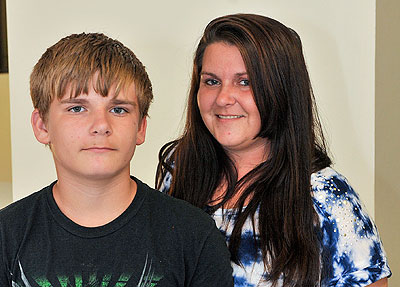Sean and Amanda strengthen family bonds and overcome adversity
Sean will soon turn 12. He’s looking forward to junior high school, playing football, continuing his artwork and the upcoming mental challenges of being in his school’s gifted program.
His mother, Amanda, talks about her son with a tone of pride that comes only from a parent when speaking of her child. But the pride in her son also contains the context of his journey. Well, not just his journey, but the family’s.
When he was in kindergarten, Sean was diagnosed with ADHD. Subsequent diagnoses followed as a result of numerous behavior problems – defiance and physical and verbal aggression. Amanda worked a difficult schedule that required her to be away from the home for long periods of time, and extended family and babysitters then cared for Sean.
“We went through numerous babysitters,” Amanda said. “I never knew what to expect when I was home, and I was anxious when I had to work.”
She got called many times.
“They’d say, ‘We can’t do anything with him,’” she said. “He’d lash out at them, his peers and anyone else. He was disrespectful to adults. He even cut open mattresses.”
He was failing at school. But the cause was more than Sean’s medical condition. His father lived in a different city, and he didn’t know how to cope with his mother’s job which kept her away from home every other week. Relatives and babysitters supervised him differently. The mixed messages caused more problems with Sean’s behavior. It was untenable. Mississippi Youth Programs Around the Clock Primary Service Coordinator Katina Veal first met the family at a fast-food restaurant and explained what would happen.
“Sean was very well-behaved and informative,” Veal said. “During the family’s first team meeting, we created a behavior plan for the home and a de-escalation plan.”
Sean had to accept direction. Most important, he had to respect authority and accept being told no. Youth Villages Mental Health Therapist Kimberly Rose helped Sean cope with his environment through breathing and relaxation techniques. Family meetings with aunts, grandparents, babysitters and even Sean’s friends resulted in consistent messages.
“Each adult had strengths to use toward decreasing Sean’s behaviors,” Katina said. “We showed school officials what we were doing, and they got on board with helping Sean.”
Kimberly continued working with Sean. They found effective and appropriate ways for Sean to communicate his feelings as well as ways to dissipate his aggression.
And then, there was football. In addition to being a great way to release aggression, the sport also introduced discipline and responsibility.
“I have to be on time,” Sean said. “I have to be respectful and keep my grades up so I can play.”
Sean is back in regular school. Amanda says he still has episodes, but he acts and behaves more like an 11-year-old.
“It just shows how things can change when everyone gets on board to help,” she said. “We’re continuing to work, but it’s so much better now.”







